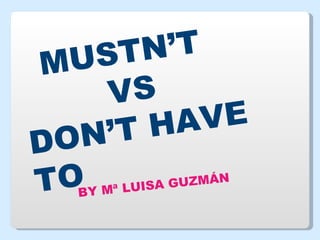Mustn't vs don't have to ii┬║ ppt
- 1. MUSTNŌĆÖT VS DONŌĆÖT HAVE TO BY M┬¬ LUISA GUZM├üN
- 2. MustnŌĆÖt is the negative of must. We use mustnŌĆÖt to say that something is the wrong thing to do or when we give someone an obligation not to do something. Doctor: YouŌĆÖre very ill. You mustnŌĆÖt go to school today. Teacher: Be quiet! You mustnŌĆÖt talk in the lesson! Parent: You mustnŌĆÖt stay out after midnight. Friend: You mustnŌĆÖt use my things without asking me!
- 3. DonŌĆÖt / doesnŌĆÖt have to is the negative of have to. We use donŌĆÖt / doesnŌĆÖt have to , to say that something is not necessary. ItŌĆÖs a holiday tomorrow, so we donŌĆÖt have to go to school. I love Sundays because I donŌĆÖt have to get up early. You donŌĆÖt have to wash that shirt ŌĆō it isnŌĆÖt dirty. JimŌĆÖs parents are rich, so he doesnŌĆÖt have to worry about money.


